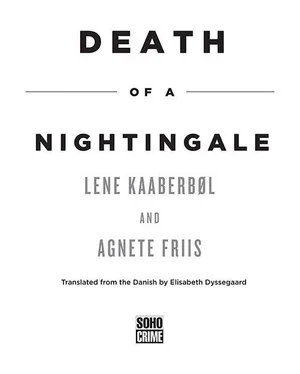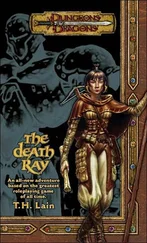Lene Kaaberbol - Death of a Nightingale
Здесь есть возможность читать онлайн «Lene Kaaberbol - Death of a Nightingale» весь текст электронной книги совершенно бесплатно (целиком полную версию без сокращений). В некоторых случаях можно слушать аудио, скачать через торрент в формате fb2 и присутствует краткое содержание. Год выпуска: 2013, ISBN: 2013, Издательство: Soho Crime, Жанр: Старинная литература, на английском языке. Описание произведения, (предисловие) а так же отзывы посетителей доступны на портале библиотеки ЛибКат.
- Название:Death of a Nightingale
- Автор:
- Издательство:Soho Crime
- Жанр:
- Год:2013
- ISBN:1616953047
- Рейтинг книги:5 / 5. Голосов: 1
-
Избранное:Добавить в избранное
- Отзывы:
-
Ваша оценка:
- 100
- 1
- 2
- 3
- 4
- 5
Death of a Nightingale: краткое содержание, описание и аннотация
Предлагаем к чтению аннотацию, описание, краткое содержание или предисловие (зависит от того, что написал сам автор книги «Death of a Nightingale»). Если вы не нашли необходимую информацию о книге — напишите в комментариях, мы постараемся отыскать её.
Death of a Nightingale — читать онлайн бесплатно полную книгу (весь текст) целиком
Ниже представлен текст книги, разбитый по страницам. Система сохранения места последней прочитанной страницы, позволяет с удобством читать онлайн бесплатно книгу «Death of a Nightingale», без необходимости каждый раз заново искать на чём Вы остановились. Поставьте закладку, и сможете в любой момент перейти на страницу, на которой закончили чтение.
Интервал:
Закладка:
Nina was still amazed that Rina had spoken to Søren. Yes, he had an advantage because he could speak Russian with her. But that wasn’t all. There was something solid about him. Quiet but immovable. Apparently his Paul Newman–like aura also worked wonders on traumatized eight-year-old girls.
She went back to the living room, where Rina was now lying on the couch with a comforter around her, her face turned toward the television screen. Little Japanese figures, looking to Nina primitively drawn or at least very stylized, raced by in a melee of explosions. Rina’s eyes were almost shut. Nina debated whether she could get away with turning off the television but decided not to. It would be good if Rina fell asleep again—she needed it.
9:26.
Still an hour and thirty-four minutes to go until she would get to see Anton. The school carnival began at 11:00.
Rina was still clutching her backpack. The by now somewhat grubby mini Diddl mouse attached to the zipper appeared to be staring at Nina with supersized eyes. Nina wanted to hug the girl, silly stuffed mouse backpack and all, but she knew it was her own need and not the child’s.
9:28. Morten might already be helping Anton with his costume. This year Nina hadn’t been the one left with the choice between spending a fortune at the toy store or spending a weekend creating a costume. Anton usually had firm opinions about what he wanted to be. She remembered the year he insisted on being a traffic light—in terms of costume construction one of the easier options—it could basically be produced from a cardboard box, a couple of mini flashlights and some silk paper. But he had had a ball running around and yelling, “Stop! Red light!” to innocent passersby.
This year she had been left completely out of the loop. Morten hadn’t even told her when the carnival was; she had had to track down that information herself on the school’s intranet page.
She went back into the kitchen, where she had a better view of the street outside. Magnus would be here soon. He had promised to stand in for her so that there would still be someone familiar there for Rina. When she entered the room, the cud-chewing ceased for a moment or two before the PET guy lowered his gaze and continued tapping on his not-quite-an-iPad.
There was a faint noise from the living room. It was barely audible through the sound effects from the cartoon, but still reached Nina’s Rina radar. She listened to Rina’s whispering voice. For more than two years, she had seen and heard Rina use the broken cell phone. Not until yesterday had she seriously begun to worry whether it was something other than a game—perhaps a somewhat obsessive game, but still a game. Never in all that time had she guessed that what Rina was really doing was talking to her dead father.
Blind. Deaf. Dumb. How could Nina not have seen it? It made her wonder how well she actually understood the traumatized people who surrounded her. Maybe she wasn’t really any better at solving their problems than at handling her own.
The thought gave her a hollow feeling inside. Her entire adult life, she had seen herself as someone you could count on when the going got tough. Someone who “made a difference”—that worn phrase used about everything from people who sorted their garbage and once in a while took the bus to those who went on dangerous, potentially deadly peacekeeping missions. She knew that she had been party to saving lives, to improving them. The cost had been her own family.
Or not quite.
It wasn’t quite that black and white, she did realize that. Morten would probably have been able to live with the fact that she had a job that consumed her, that sometimes demanded so much of her that there was too little left for him—and sometimes too little even for Ida and Anton. That wasn’t why he had ended it.
It was because she always had to go right up to the edge—and then take one more step. Because she, in his words, had transformed her life into a war zone. It wasn’t enough to take an extra shift at the Coal-House Camp and attempt to help the people shipwrecked there. She had promised not to go on missions abroad anymore, and she had kept that promise. Instead, she had committed herself to aiding people Danish society considered “illegals.” The ones who couldn’t go to the emergency room or see a doctor, the ones who couldn’t go to the police when they were the victims of crimes. People like Natasha who had to accept squalor or abuse, either because they had no choice or because almost anything was better than being sent back where they came from.
She was good at it. In a crisis situation she was calmly efficient, perfectly able to act, to think, to do something. She missed that capable version of herself when things became too humdrum. For Christmas this year Ida had given her a T-shirt she had managed to get hold of from some ad campaign extolling the virtues of public transportation; it was bright green and had the words WORLD SAVIOR printed in big letters across the chest.
Nina wasn’t stupid. She had done therapy, and she knew perfectly well where it came from, this compulsion to save the ones no one else wanted to bother with. She could say precisely, to the minute, when it had begun: the day she had run home from school during the lunch break and had found her father in the bathroom in the basement.
She forced herself to remember. Consciously, dispassionately. Don’t avoid it. Confront it. Water on the floor. Blood on the floor. Blood in the water. Her father lying in the water with all his clothes on, turning his head slightly to look at her with eyes that resembled those of a fish. That far she could go.
It was the hour following that she couldn’t account for. No matter how hard she tried, all she could remember was going next door to get help. Right away. I went over there right away. She had repeated it again and again to the police, to the therapists, to the doctors and all the other grown-ups, even though they all kept on telling her that it couldn’t be true. She remembered how frustrated she was that they wouldn’t believe her, that they tried to make her accept their correct, adult, superior understanding of time and place. And the ugly, world-swallowing vortex she found herself floundering in when she began to realize that they were right. Almost an hour had passed between the moment when she went down into the basement and the moment when she came up again. And during that hour, her father had died.
Morten knew, of course. For many years he had understood, condoned, shielded and protected when she would allow him to do so. He knew the gap was there and what it cost her not to fall into it. What he couldn’t accept was that their children also had to live on the edge of that abyss.
She listened to Rina’s whispering voice and did not interrupt. Let the girl speak with her father, she thought. Who am I to tell her that she’s wrong, that the phone doesn’t work, that her father can no longer hear her and is never coming back?
When Nina had the sense that Rina was saying goodbye, she stepped into the living room. And it was only then that she saw that the phone Rina was speaking into wasn’t the broken cell phone but the landline on Søren’s desk.
“Who were you speaking to?” she asked.
Rina started. “No one.”
Who did Rina even know that she would think of calling? Someone at the Coal-House Camp? Natasha? Rina had been speaking Ukrainian, but how on earth could she have gotten a number that would connect her with her mother?
“Was it … your father?”
Rina shrugged and bowed her head. “It doesn’t work anymore,” she said.
“Why not?”
“It’s broken. He said so. The policeman.”
Nina went over to the phone and pressed REDIAL. The telephone rang five, six, seven times. Then a friendly man’s voice said, “You’ve reached Anna and Hans Henrik Olesen. We can’t come to the phone right now, but leave a message, and we’ll call you back.”
Читать дальшеИнтервал:
Закладка:
Похожие книги на «Death of a Nightingale»
Представляем Вашему вниманию похожие книги на «Death of a Nightingale» списком для выбора. Мы отобрали схожую по названию и смыслу литературу в надежде предоставить читателям больше вариантов отыскать новые, интересные, ещё непрочитанные произведения.
Обсуждение, отзывы о книге «Death of a Nightingale» и просто собственные мнения читателей. Оставьте ваши комментарии, напишите, что Вы думаете о произведении, его смысле или главных героях. Укажите что конкретно понравилось, а что нет, и почему Вы так считаете.










